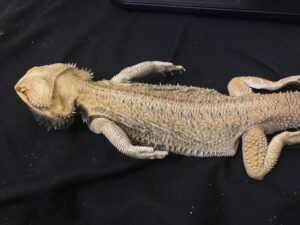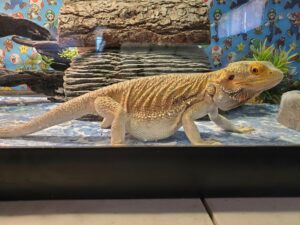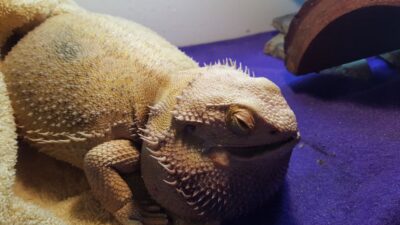If you notice that your bearded dragon looks bloated, it’s important to take a closer look as this could be a sign of several potential health issues. Bloating in bearded dragons can stem from various causes, ranging from dietary problems and impaction to more serious conditions like organ failure or infections.
Identifying the root cause is crucial for effective treatment and ensuring your pet’s well-being. In this guide, we’ll explore the common causes of bloating in bearded dragons, offer practical tips for management, and highlight when it’s essential to seek veterinary care.
What Is Bloating in Bearded Dragons?

Bloating in bearded dragons can be a sign of several underlying issues. It typically refers to the swelling or distension of the abdomen. Here are some common causes:
- Impaction: This occurs when a bearded dragon ingests something that causes a blockage in their digestive tract. It can result from eating substrate (like sand), large food items, or indigestible objects.
- Parasites: Internal parasites can cause bloating by causing inflammation and swelling in the digestive system.
- Infections: Bacterial or viral infections can lead to fluid accumulation and swelling in the abdomen.
- Overfeeding: Overeating can sometimes cause temporary bloating, especially if a bearded dragon consumes more food than usual or if the food is not digested properly.
- Egg Binding: For female bearded dragons, if they are unable to lay eggs, it can cause bloating and discomfort.
- Kidney or Liver Disease: Issues with these organs can lead to fluid buildup and abdominal swelling.
Symptoms to Watch For
- Swelling or distension of the abdomen
- Lethargy or decreased activity
- Loss of appetite
- Changes in stool consistency or frequency
What to Do
If you notice any signs of bloating, it’s important to consult a veterinarian who specializes in reptiles. They can diagnose the underlying cause and recommend appropriate treatment. Immediate action can help prevent more serious complications and ensure your bearded dragon stays healthy.
Common Causes of Bloating
Bloating in bearded dragons can be caused by various issues. Here are some common causes:
- Impaction: This is a blockage in the digestive tract, often due to ingesting inappropriate substrates (like sand or gravel), large food items, or indigestible objects. It prevents normal digestion and can cause abdominal swelling.
- Parasites: Internal parasites like worms or protozoa can cause inflammation in the digestive system, leading to bloating and discomfort.
- Infections: Bacterial, viral, or fungal infections can lead to fluid buildup in the abdomen, resulting in bloating.
- Overfeeding: Consuming excessive amounts of food, especially if it’s not digestible or is too large, can cause temporary bloating.
- Egg Binding: Female bearded dragons can experience bloating if they have trouble laying eggs, leading to discomfort and swelling in the abdomen.
- Kidney or Liver Disease: Health issues affecting the kidneys or liver can result in fluid accumulation in the abdomen, causing bloating.
- Obesity: Excessive weight can sometimes cause bloating, particularly if the bearded dragon’s diet is not balanced.
- Dehydration: Severe dehydration can sometimes contribute to abdominal swelling, though this is less common.
If you notice signs of bloating, it’s crucial to consult a reptile vet to determine the exact cause and get appropriate treatment.
How to Spot Bloating
Spotting bloating in bearded dragons involves observing a few key signs and changes in their behavior or appearance. Here’s how to tell if your bearded dragon might be bloated:
- Swollen Abdomen: Check if your bearded dragon’s belly looks noticeably larger or distended. It may appear swollen or puffed up compared to its usual size.
- Change in Shape: Feel gently along the belly. It might feel firm or hard, rather than soft and normal.
- Behavior Changes: Look for signs of discomfort or distress. Your bearded dragon might be less active, more lethargic, or show signs of pain.
- Eating and Drinking Habits: Monitor changes in appetite or drinking habits. A decrease in appetite or refusal to eat can be a sign of an underlying issue.
- Stool Changes: Observe changes in their stool. Bloating might be accompanied by irregular or abnormal stools.
- Breathing Difficulty: In severe cases, bloating can cause difficulty breathing. If your bearded dragon is breathing heavily or seems to be struggling to breathe, it’s a serious concern.
- Abnormal Posture: Watch for any unusual postures or movements, like stretching out more than usual or curling up in an unusual way.
If you notice any of these signs, it’s a good idea to consult a reptile vet as soon as possible. They can provide a proper diagnosis and recommend the best course of action to help your bearded dragon.
What to Do if Your Bearded Dragon Is Bloated

If you notice that your bearded dragon is bloated, here’s a step-by-step guide on what to do:
- Observe and Assess: Take note of any other symptoms your bearded dragon might have, like changes in appetite, behavior, or stool. This information will be helpful for the vet.
- Check for Impaction: Gently feel the belly to see if it’s hard or swollen. If you suspect impaction, avoid giving food until you consult a vet.
- Ensure Proper Hydration: Make sure your bearded dragon has access to fresh water. Dehydration can sometimes worsen bloating.
- Adjust Diet: If the bloating seems related to recent dietary changes, temporarily adjust their diet to offer easier-to-digest foods.
- Provide a Suitable Environment: Ensure their habitat is set up correctly with appropriate temperature and humidity. A well-maintained environment supports overall health and digestion.
- Seek Veterinary Advice: Contact a reptile vet as soon as possible. They can perform a thorough examination and diagnose the cause of the bloating. They may suggest treatments like medication, changes in diet, or other interventions based on their findings.
- Follow Veterinary Recommendations: Adhere to the vet’s advice carefully. This may include medication, dietary changes, or specific care instructions.
- Monitor Progress: Keep an eye on your bearded dragon’s condition and follow up with the vet if there are no improvements or if new symptoms develop.
Prompt action can help address the issue before it becomes more serious, so don’t hesitate to seek professional help.
Preventing Bloating in bearded dragon
Preventing bloating in bearded dragons involves a combination of proper care, diet, and habitat management. Here are some practical tips to help keep your bearded dragon healthy and reduce the risk of bloating:
- Provide a Balanced Diet: Feed your bearded dragon a varied diet that includes appropriate live insects, fresh vegetables, and fruits. Avoid overfeeding and ensure the food is of suitable size to prevent impaction.
- Avoid Inappropriate Substrates: Use safe substrates like reptile carpet or paper towels instead of sand or gravel, which can lead to impaction if ingested.
- Ensure Proper Hydration: Always provide fresh water and encourage your bearded dragon to drink. You can also mist their food lightly to help with hydration.
- Monitor Food Intake: Be mindful of how much and how often you feed your bearded dragon. Avoid feeding large amounts of food at once, as this can cause digestive issues.
- Maintain Optimal Temperature and Humidity: Keep their habitat at the right temperature and humidity levels. Proper environmental conditions support healthy digestion and overall well-being.
- Regularly Clean the Habitat: Keep the enclosure clean to prevent bacterial and fungal growth, which can contribute to infections.
- Provide Exercise: Encourage your bearded dragon to move around and be active. Regular exercise helps with digestion and prevents obesity.
- Check for Parasites Regularly: Have your bearded dragon examined by a vet periodically to check for parasites that could cause digestive issues.
- Monitor for Early Signs: Keep an eye on your bearded dragon’s behavior and appearance. Address any signs of discomfort or unusual changes promptly to prevent more serious issues.
By following these tips, you can help maintain your bearded dragon’s health and reduce the risk of bloating and other related problems.
Conclusion
If your bearded dragon bloated, it can be a sign of various issues such as impaction, parasites, infections, or dietary problems. Monitoring their diet, hydration, and habitat can help prevent bloating.
However, if you notice any signs of a bloated bearded dragon, it’s crucial to consult a reptile vet for an accurate diagnosis and appropriate treatment. Prompt attention can help address the problem and ensure your bearded dragon remains healthy and comfortable.

